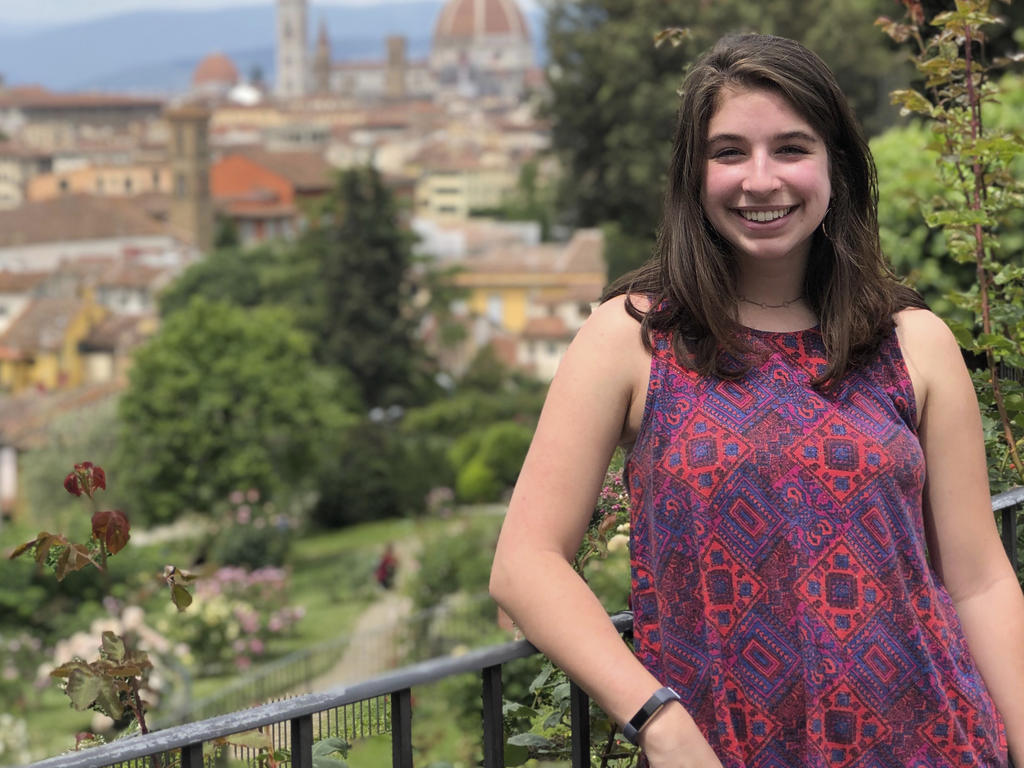Despite the pandemic putting a halt to hospital internships, fellowships, and research opportunities for aspiring health care workers this summer, Birmingham, AL, native Demi Shamsi-Basha ’22 remained committed to public health and to helping the Memphis community. Volunteering on the front lines of Church Health’s drive-through COVID-19 testing site at Crosstown Concourse, the neuroscience major and French minor has borne witness to the realities of the pandemic in Memphis and the vigorous citywide efforts to slow the spread.
Gowned, masked, and gloved, Shamsi-Basha is the first checkpoint at the contactless, drive-through site. Before approving cars for entry to the testing station, she first greets patients, confirms their appointments, and verifies their personal information. “It’s a very efficient process,” says Shamsi-Basha. “On a normal day, patients get in and out in less than 10 minutes. The site is free and open to anyone, whether or not they have insurance. People from all over the city are taking advantage of the site, either because they have symptoms, have been in contact with someone who tested positive, or are essential workers.”
Although this work presents risks, Shamsi-Basha says it’s the risk that reinforces her desire to pursue medicine. “It’s a reality doctors have always had to face, but as a nation we have been awakened to the extent of that risk and the courage it takes to provide care and ensure the safety of patients.”
Last summer, Shamsi-Basha completed a three-week fellowship at San Camillo Hospital in Rome, Italy. There, she shadowed doctors in transplant surgery, interventional radiation, and obstetrics and gynecology and witnessed many surgeries and procedures from inside the operating room.
Shamsi-Basha’s volunteer work this summer stems from her pre-health coursework and her involvement in Rhodes’ Health Professions Society, which promotes student exploration of health care careers, research, and service opportunities. She credits many of her non-science classes with helping her see the effects of pandemics and the many structural forces fueling global health crises. “Even though being able to safely administer tests and reduce the number of cases in the area is great, there are still a lot of barriers that our city faces. Our site is limited to 100 tests per day, which is regulated by the government, so not everyone who needs a test can get one,” says Shamsi-Basha. “This is also a drive-through site—you can’t just walk up and get tested—so people who don’t have cars or can’t get rides can’t get tests, and this is how a lot of the sites around the country are.”
Even with the many setbacks and challenges COVID-19 presents, Shamsi-Basha is attuned to the progress and medical advancements that are sure to follow as the public continues to gain knowledge on global health. “If there is one thing doctors and researchers everywhere are learning as a result of COVID-19, it’s how health and health care access are socially influenced, and that we need more prevention initiatives in place to be better equipped to respond to health crises. I see a lot of advancements being newly prioritized for health care workers, too, such as personal protection equipment, telemedicine, and other measures reducing in-person contact when possible.
“I know that my experience as a medical professional is going to be so different from those who worked in health care during the pre-pandemic era, but it is unifying, in a way. Everyone is combating this together, and we will all have to learn, adapt, and adjust to new ways to treat patients and deliver care that are more regulatory, but just as effective.”
Shamsi-Basha has been accepted to the George Washington School of Medicine and Health Sciences through its Early Selection Program, a highly competitive program that provisionally accepts a few applicants for post-graduate admission following the completion of their sophomore year.
By Grace Merriman ’21
Recently, Rhodes College ranked 11th for “Students Most Engaged in Community Service” and was recommended as one of the nation's best institutions for undergraduates to earn their college degree in The Princeton Review’s newest edition of The Best 386 Colleges.
More than 80 percent of Rhodes students are engaged doing meaningful work in the community.
Rhodes is a nationally ranked residential college committed to the liberal arts and sciences. Our highest priorities are intellectual engagement, service to others, commitment to diversity and inclusion, and honor among ourselves. Our students live and learn on one of the country’s most beautiful campuses, located in the heart of Memphis, an economic, medical, and cultural center, making Rhodes one of a handful of prominent liberal arts colleges in a major metropolitan area.
